In State v. Michael A. Jackson, (A-11-19/082735)(Decided July 2, 2020), the Supreme Court of New Jersey held that the defendant was deprived of his right to confrontation and denied a fair trial. According to the court, the jury should have had full access to the cooperating witness’s plea agreement history through the defense counsel’s unfettered examination of that history.
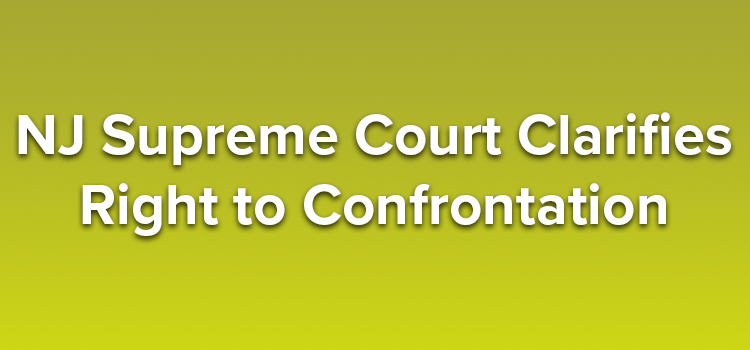
Facts of State v. Jackson
Tiffany Taylor, Javon Clarke, and defendant Michael A. Jackson were arrested and charged with participating in a burglary. Clarke accepted a cooperating plea offer in which he agreed to provide testimony inculpating defendant and Taylor in exchange for a three-year sentence. The trial judge urged modification of the plea agreement, suggesting Clarke’s sentencing exposure be lowered to 180 days in county jail, and probation. Under the new plea deal, Clarke testified that defendant and Taylor participated in the burglary.
In an effort to demonstrate Clarke’s bias in favor of the prosecution, counsel for Jackson sought to elicit during cross-examination the sentencing range of three to five years’ imprisonment that Clarke would have faced had he not accepted a plea offer in exchange for agreeing to testify against defendant. The trial court barred the line of questioning regarding Clarke’s maximum sentencing exposure, explaining that such information could improperly prejudice the jury if they heard Clarke’s maximum sentencing exposure on the same crimes as defendant. The trial court permitted defense counsel to elicit testimony regarding only the initial plea offer of three years’ imprisonment and the final plea agreement, in which Clarke accepted 180 days’ imprisonment in county jail, plus probation. The trial court permitting the State to use the low end of the sentencing range led to testimony that Clarke had not received “such a good deal.”
The jury acquitted defendant and Taylor of burglary and theft but convicted them of conspiracy to commit burglary. Defendant was sentenced to an extended term of seven years’ imprisonment. On appeal, defendant argued that the trial court’s limitation on the cross-examination of Clarke deprived him of his constitutional right to confront a key adverse witness. Defendant also argued that the limitation was exacerbated when the State was allowed to reference the low end of the range. The Appellate Division rejected defendant’s arguments and affirmed his conviction.
Confrontation Clause
The Confrontation Clause allows a defendant to explore, through cross-examination, the potential bias of a prosecution’s witness. While a trial court may impose reasonable limits on such cross-examination based on concerns about harassment, prejudice, confusion of the issues, the witness’s safety, or interrogation that is repetitive or only marginally relevant, etc., the competing interest proffered to limit a defendant’s confrontation right must be closely examined. In State v. Bass, 224 N.J. 285, 305 (2016), the New Jersey Supreme Court held that, “[i]f a witness faces a pending investigation or unresolved charges when he or she gives a statement to law enforcement, cooperates with the prosecution in preparation for trial, or testifies on the State’s behalf, that investigation or charge is an appropriate subject for cross-examination.”
NJ Supreme Court’s Decision in State v. Jackson
The New Jersey Supreme Court reversed. “The jury should have had full access to Clarke’s plea agreement history through the defense counsel’s unfettered examination of that history,” Justice Walter F. Timpone wrote. “We hold the trial court’s limitations on defendant’s cross examination to be in error.”
In his opinion, Justice Timpone noted that New Jersey state courts had not previously considered the scenario in which a trial court limits cross-examination into the term of imprisonment a cooperating witness avoided by testifying for the government where the defendant and witness were charged with the same crime. Looking to other jurisdictions, the court found that most state and federal courts have based their determinations on whether the jury had otherwise heard enough information to evaluate the witness’s credibility. The Court also found that the principles articulated in Bass applied.
Based on the foregoing, the court went on to conclude that Defendant was entitled to question Clarke about his subjective understanding of the benefit of his plea bargain, including what sentence he faced and what was offered in the plea agreement. According to the court, “This case is a particularly compelling example of the import of a fulsome right to confront adverse witnesses,” noting that Clarke was the State’s key witness testifying at trial, his testimony was the only evidence tying defendant to the crime, and the record revealed that Clarke acknowledged lying to police officers on several occasions about the events that transpired during the burglary. Justice Timpone further explained:
The potential for an extended-term state prison sentence may have served as a powerful incentive for Clarke to cooperate with the State. The trial court barred all testimony about the maximum sentence Clarke faced, which in turn prevented the jury from hearing the effect that sentencing exposure had on Clarke’s mindset when negotiating his plea with the State. The jury should have been made aware that Clarke entered into a plea bargain with the State and that, by virtue of his plea bargain, Clarke faced only 180 days in county jail instead of a lengthy term in state prison.
The New Jersey Supreme Court also rejected the State’s argument that if an error was committed, it was harmless. “The State substantially premised its case on the jury’s acceptance of Clarke as a credible witness. Had the jury been aware that Clarke was potentially facing an extended term of ten years in state prison when taking a plea deal of 180 days in county prison, it may well have drawn an inference of bias,” Justice Timpone wrote. “Additionally, the jury acquitted defendant and Taylor of burglary and theft. Such an inference of bias could have further affected Clarke’s credibility as the State’s key witness, and perhaps yielded a full acquittal.”
The court remanded the case for a new trial on the conspiracy charge.
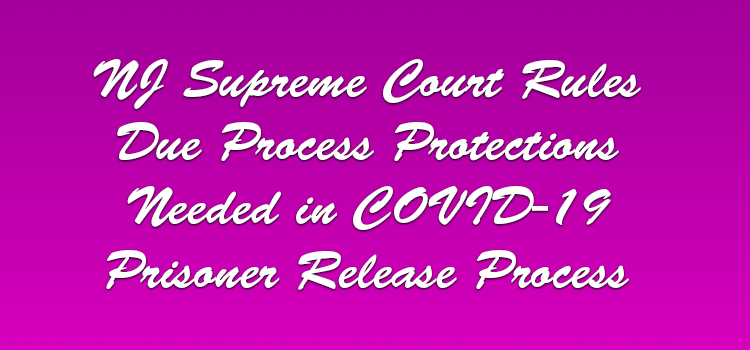
The Supreme Court of New Jersey recently held that due process protections must be added to the process by which New Jersey prisoners may seek a medical furlough under Executive Order 124. Specifically, the court held in In the Matter of the Request to Modify Prison Sentences, Expedite Parole Hearings, and Identify Vulnerable Prisoners (M-1093-19/084412)(June 5, 2020S) that inmates must be given an opportunity to be heard and to learn why a medical furlough was denied.
Facts of the Case
The Office of the Public Defender and the American Civil Liberties Union of New Jersey (ACLU) applied directly to the New Jersey Supreme Court for relief relating to the spread of the coronavirus in prison settings. They essentially asked the Judiciary to order a framework for the early release of several groups: adults and juveniles serving a sentence that will expire in the next year; individuals eligible for parole; and any defendant who is particularly vulnerable to COVID-19.
On April 10, 2020, two days after the Public Defender and ACLU wrote to the Court, the Governor issued Executive Order 124. Executive Order 124 created a mechanism to identify inmates in state prison to be considered for parole or a medical furlough due to the COVID-19 pandemic. The Executive Order provides two tracks for review, directing the Parole Board to expedite its consideration of inmates for parole and the Commissioner of the Department of Corrections (DOC) to decide whether to grant a medical furlough — an “emergency medical temporary home confinement.”
Consistent with existing law, the Parole Board provided inmates with an individualized statement of reasons for cases in which it denied parole. Inmates denied a medical furlough received a two-sentence form letter from the Commissioner that notified them of the outcome but did not set forth any reasons. Inmates denied parole have an avenue for appeal; inmates denied a medical furlough under the Executive Order do not.
As to the two tracks the Executive Order created to consider inmates for release, the Parole Board has been considering inmates in a manner consistent with existing practices. That includes various due process protections that attach to the parole process. Through a different process, the Commissioner, with help from the Review Committee, has been addressing medical furloughs.
New Jersey Supreme Court’s Decision
“We hold that because the order creates a sufficient expectation of eligibility for release through a furlough program, the order calls for certain due process protections,” Chief Justice Stuart J. Rabner wrote on behalf of the unanimous court. “At a minimum, due process requires notice and an opportunity to be heard.”
According to the court, the following protections must be added to the Executive Order to comport with due process:
(1) inmates are to be afforded an opportunity to present a written statement in support of their request to be furloughed in the same way that prosecutors and victims are allowed to express their views. Inmates may proceed on their own or with the help of volunteer lawyers. The Public Defender’s Office has volunteered its assistance and should be provided with the lists of eligible inmates generated under the Order, under seal, subject to a protective order;
(2) the Commissioner is to provide a statement of reasons to inmates who are denied a medical furlough to help guard against mistakes and arbitrary decisionmaking and allow for meaningful judicial review if it is sought; and
(3) inmates are to be given an opportunity to respond in order to try to satisfy the Commissioner’s concerns and cure any mistakes. The Commissioner shall consider each response before issuing a final decision.
The New Jersey Supreme Court further held that inmates may challenge the DOC’s action, a final agency decision, by seeking review before the Appellate Division. Individual inmates may also seek relief independently under Rule 3:21- 10(b)(2). Moreover, they do not have to exhaust the remedies available under the Executive Order before they may file a motion in court.
The court also expressed concerns about timeliness. “Because of the risks COVID-19 poses, which are amplified in jail settings, each day matters,” Chief Justice Rabner wrote. “To the extent this opinion calls for trial judges to rule on motions and the Appellate Division to review agency decisions, we exercise the court’s supervisory authority to require that applications be heard and decided in a matter of days.”
In S.C. v. New Jersey Department of Children and Families (A-57-18/081870) (May 27, 2020), the Supreme Court of New Jersey raised serious concerns about the “not established” finding used by the New Jersey Department of Children and Families (DCF or Department), characterizing it as “vague, amorphous, and incapable of any objective calibration” because it requires less than a preponderance of the evidence. However, because the issue was not raised by the plaintiff, the court declined to abolish the standard.
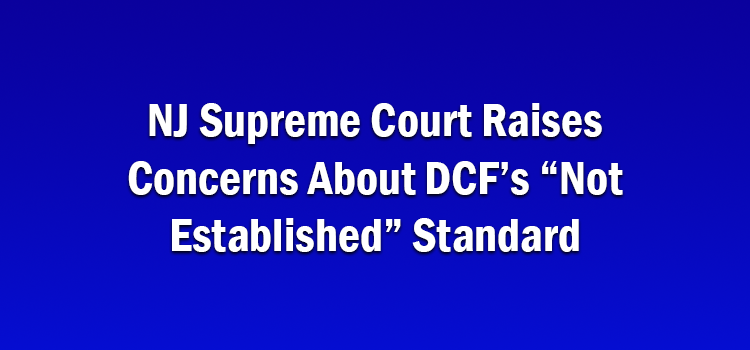
Facts of S.C. v. New Jersey Department of Children and Families
The case involves DCF’s investigation into a claim that a mother, S.C., abused her seven-year-old son by engaging in corporal punishment. The investigation concluded that the claim of abuse was “not established.” Pursuant to N.J.A.C. 10:129-7.3c(3), the Division enters a finding of “Not Established” when some evidence indicates that a child was harmed or placed at some risk of harm, but there is not a preponderance of evidence that the child has been abused or neglected per N.J.S.A. 9:6-8.21.
DCF sent a letter informing S.C. of that finding, but the letter provided little detail and no explanation for that determination. Because the abuse allegation was deemed “not established,” it is not eligible to be expunged. The Legislature requires expunction only for child abuse or neglect allegations determined to be “unfounded,” and no statutory or regulatory provision authorizes expunging allegations of the other three possible determinations. Although the record and report involving S.C.’s “not established” finding is statutorily confidential, the information can be made available under circumstances identified by the Legislature in N.J.S.A. 9:6-8.10a.
S.C. appealed the Department’s action, claiming (1) a deprivation of her due process rights because she was not afforded a hearing and (2) that the Department’s “not established” finding was arbitrary and capricious because the record was insufficient to support a finding that her son was harmed. The Appellate Division’s decision affirmed the Department’s action, with a concurrence expressing a need for revision in the Department’s processes.
NJ Supreme Court’s Decision in
The New Jersey Supreme Court reversed and remanded. “We remand (a) for the Department to provide improved notice of the basis on which its investigation has found some evidence — which we here stress must be some credible evidence — to support the allegation of harm; and (b) for S.C. to have an informal opportunity before the Department to rebut and/or supplement the record before the Department finalizes its finding,” Justice Jaynee LaVecchia wrote.
In reaching its decision, the court concluded that S.C.’s reputational interest could be properly respected without the requirement of a full-fledged adjudicatory hearing. However, it further concluded that due process requires notice and opportunity to be heard. Justice LaVecchia explained:
When the Department is concluding an investigation into suspected child abuse or neglect and expects to issue a finding of “not established,” notice — meaningful for due process considerations — of that investigatory finding should be provided to the individual. The notice should include a summary of the support for the finding, and the Department’s reasoning should be transparently disclosed. Moreover, the individual must be informed of his or her opportunity to rebut the Department’s conclusion or supplement the record so that the informal opportunity to be heard before the agency is not illusory.
With respect to the DCF standard for making a finding of “not established,” the Court agreed with the criticism that the “standard is vague, amorphous, and incapable of any objective calibration” as currently written. “All we know is that [the ‘not established’ finding] requires less than a preponderance of the evidence and involves ‘some’ evidence,” Justice LaVecchia wrote. “At the very least, the ‘some evidence’ description advanced by the Department must be understood to be ‘credible evidence.’ Beyond that one cannot know what the Department intends by its standard and how it is to be evaluated.”
Nonetheless, the New Jersey Supreme Court held that it was DCF’s responsibility to reexamine and clarify its standard. “S.C. has not raised a direct challenge to the validity of having a ‘not established’ finding category in the Department’s regulations, although some amici have urged that the category be declared illegitimate and eliminated. We will not address an argument not raised by appellant, particularly when the Department advances a facially legitimate basis for such findings’ use and an argument that the regulation’s promulgation was reasonably within its statutory delegation of authority,” Justice LaVecchia wrote. “However, we recognize problems with the standard as presently articulated. It would be well worth the effort of the Department to revisit its regulatory language concerning the standard for making a ‘not established’ finding as well as its processes related to such findings. Our review of this matter brings to light shortcomings in fairness for parents and guardians involved in investigations that lead to such findings and which may require appellate review.”
Justice Barry Albin wrote separately, concurring in part, and dissenting in part. “I believe the majority’s decision clearly leads to a better system of justice by imposing due process requirements and calling for a new evidentiary standard for ‘not established’ findings, and I applaud that effort,” he wrote. “Nevertheless, I believe that the Department’s ‘not established’ standard is so fundamentally flawed that it defies even this Court’s remedial measures to save it.”
In Cowley v. Virtua Health System (A-47-18/081891) (Decided May 4, 2020), the Supreme Court of New Jersey held that the “common knowledge” exception to the Affidavit of Merit Statute did not apply to the plaintiff, a hospital patient who removed her own breathing tube and refused replacement.
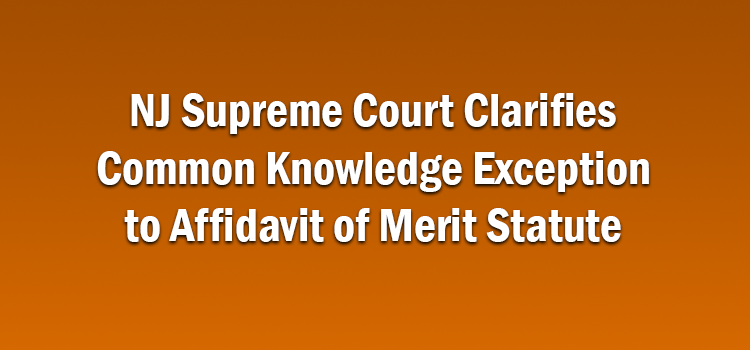
Facts of Cowley v. Virtua Health System
Plaintiff Linda Cowley was admitted to Virtua Voorhees Hospital (Virtua). A physician entered an order directing nursing staff to insert a Nasogastric Tube (NG Tube), a tube that passes through the nose into the stomach to deliver medicine, liquids, and liquid food to a patient. According to Virtua’s records, Cowley removed her NG Tube overnight and refused replacement. Cowley and her husband (collectively, the “plaintiffs”)sued Virtua and others, alleging defendants did not comply with the written order to insert an NG Tube and that her condition deteriorated while the NG Tube was dislodged.
Defendants filed a demand for an affidavit of merit. New Jersey’s Affidavit of Merit Statute (N.J.S.A. 2A:53A-27) requires that, in malpractice actions, plaintiffs “provide each defendant with an affidavit of an appropriate licensed person that there exists a reasonable probability that the care, skill or knowledge exercised or exhibited in the treatment, practice or work that is the subject of the complaint, fell outside acceptable professional or occupational standards or treatment practices.” Failure to provide an affidavit or its legal equivalent is “deemed a failure to state a cause of action,” requiring dismissal with prejudice unless an equitable exception applies.
Plaintiffs argued their duty to provide an affidavit of merit was relieved because the case involved a matter of “common knowledge.” The exception applies in cases in which an expert is not needed to demonstrate that a defendant professional breached some duty of care because the carelessness of the defendant is readily apparent to anyone of average intelligence.
The trial court dismissed plaintiffs’ complaint with prejudice, determining that the common knowledge exception did not apply and an affidavit of merit was required. The Appellate Division reversed, holding that the common knowledge exception was applicable to this case, reasoning that “common sense dictates that some action should have been taken when the nurses were confronted with the sudden termination of Linda’s medical treatment that was required by the physician charged with her care.”
NJ Supreme Court’s Decision in Cowley v. Virtua Health System
The New Jersey Supreme Court reversed, holding an affidavit was required. In reaching its decision, the court emphasized that the common knowledge exception to the Affidavit of Merit Statute applies only in the limited cases where a person of reasonable intelligence can use common knowledge to determine that there was a deviation from a standard of care and an expert is no more qualified to attest to the merit of a plaintiff’s malpractice practice claim than a non-expert.
“This is not one of those cases. Here, where a patient removed the tube herself and refused replacement, important questions about the procedures, protocols, and duties of a licensed nurse in these circumstances must be explained in order to establish a deviation in the standard of care,” Justice Faustino Fernandez-Vina wrote for the court. “In addition, important considerations about patient autonomy complicate the standard-of-care analysis. A jury could not reach a determination as to a nurse’s responsibility under these circumstances without the benefit of expert opinion as to the appropriate balance between patient autonomy and prescribed treatment.”
The New Jersey Supreme Court disagreed with the Appellate Division’s conclusion that the case “presents the circumstance of an alleged obvious act of omission, rather than an affirmative action that clearly bespoke negligence,” thus not requiring the “weeding out” of plaintiff’s claims.
“That approach allows plaintiffs to circumvent the Affidavit of Merit Statute by disguising complex negligence cases with common knowledge allegations as to acts of omission. Determining whether action should or should not have been taken is not enough. Jurors cannot be allowed to speculate as to whether a procedure conformed to the required professional standards of care,” Fernandez-Vina wrote.
The court also emphasized the complexity of the case, noting that “[t]his is not simply a case of failure to follow a physician’s order.” As Justice Fernandez-Vina explained, “The issue for the jury is not whether a nurse may ignore a physician’s order, but rather what steps are required of a nurse when a patient refuses reinsertion of an NG Tube after its removal.” She added: “Included in that assessment will be considerations about a patient’s exercise of a right to refuse treatment. And resolution of that issue — determination of what action, if any, should be taken under circumstances like those presented here — ultimately requires expert opinion as to the appropriate standard of care, as well as the submission of an affidavit of merit.”
In New Jersey Transit Corporation v. Sandra Sanchez (A-68-18/082292) (Decided May 12, 2020), the Supreme Court of New Jersey held that New Jersey’s no-fault auto insurance scheme does not prohibit an employer from suing to recoup workers compensation costs it paid out for a worker’s car accident injuries.
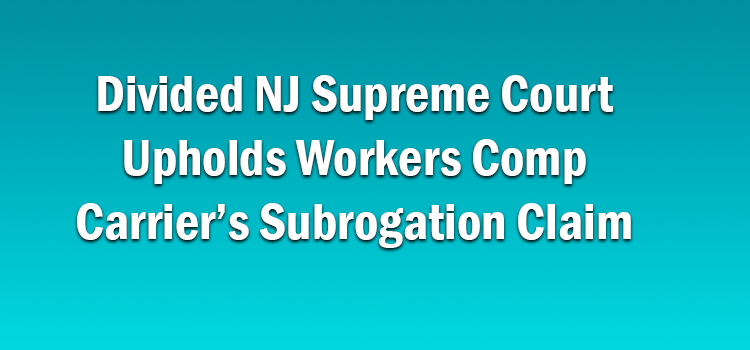
Facts of New Jersey Transit Corporation v. Sanchez
Plaintiff New Jersey Transit Corporation (New Jersey Transit) sought to recover workers’ compensation benefits paid to an employee, David Mercogliano, who sustained injuries in a work-related motor vehicle accident. It sued the individuals allegedly at fault in the accident, defendants Sandra Sanchez and Chad Smith (Defendants). The suit relied a provision of the Workers’ Compensation Act, N.J.S.A. 34:15-40, that authorizes employers and workers’ compensation carriers that have paid workers’ compensation benefits to injured employees to assert subrogation claims.
Defendants argued that New Jersey Transit’s subrogation action was barred by the Auto Insurance Cost Reduction Act (AICRA), N.J.S.A. 39:6A- 1.1 to -35. They maintained that because Mercogliano had elected the limitation-on-lawsuit option permitted by N.J.S.A. 39:6A-8(a), and sustained no permanent injury, AICRA barred New Jersey Transit’s claim.
The trial court granted summary judgment in favor of the Defendants and denied New Jersey Transit’s cross-motion for partial summary judgment. It barred New Jersey Transit’s subrogation action on the grounds that Mercogliano sustained no economic loss as defined in AICRA and that New Jersey Transit’s subrogation claim would subvert AICRA’s goals.
The Appellate Division reversed, agreeing with New Jersey Transit that the workers’ compensation benefits paid to Mercogliano related only to economic loss. It concluded that New Jersey Transit’s subrogation action did not implicate the limitation-on-lawsuit threshold imposed by N.J.S.A. 39:6A-8(a). According to the Appellate Division, because Mercogliano’s economic loss was covered by his workers’ compensation benefits — not by personal injury protection (PIP) benefits under his automobile insurance policy — New Jersey Transit’s subrogation action did not run afoul of AICRA.
NJ Supreme Court’s Decision in New Jersey Transit Corporation v. Sanchez
An equally-divided court affirmed the Appellate Division’s decision. Justice Timpone did not participate.
In a concurring opinion, Justice Anne Patterson rejected the argument that the subrogation action violated the AICRA. She was joined by Chief Justice Stuart Rabner and Justice Faustino Fernandez-Vina.
“We view New Jersey Transit’s subrogation action to comport with the objectives and terms of the Workers’ Compensation Act. We find no evidence that when the Legislature enacted AICRA, it intended to bar employers and insurers that have paid workers’ compensation benefits for economic loss from seeking reimbursement from third-party tortfeasors in cases such as this, in which the employee’s losses were covered by workers’ compensation benefits and he neither sought nor received PIP benefits,” Justice Patterson wrote. “We do not view New Jersey Transit’s subrogation action — limited to workers’ compensation benefits paid for economic losses — to contravene AICRA’s provisions or to undermine its goals.”
In her opinion, Justice Patterson emphasized that that, when it enacted AICRA, the New Jersey Legislature did not amend the Workers’ Compensation Act to eliminate or circumscribe the statutory right of subrogation in cases involving injuries to employees in motor vehicle accidents. The court also found no evidence that the Legislature, in enacting the AICRA, sought to bar employers and insurers that have paid workers compensation benefits from seeking reimbursement in cases such as this.
“Thus, the legislature made clear that when an employee injured in a work-related accident is entitled to benefits under the Workers’ Compensation Act, that statute — not AICRA — provides his or her primary source of recovery for medical expenses and lost wages,” the court said.
The New Jersey Supreme Court rejected the trial court’s conclusion that that once New Jersey Transit had paid Mercogliano’s medical expenses and awarded him disability benefits, there was no longer an “economic loss” at issue, and thus no basis for a subrogation claim. “We discern no evidence that the Legislature intended to bar a workers’ compensation subrogation claim by virtue of the very benefits that created that claim in the first place,” Justice Patterson wrote. “As did the Appellate Division, we conclude that Mercogliano suffered an economic loss in the form of medical expenses and lost wages, and that New Jersey Transit paid him benefits for that economic loss.”
Justice Barry Albin filed a dissent, in which Justices Jaynee LaVecchia and Lee Solomon joined. The dissenters argued that the majority’s decision will “ultimately lead to increased automobile insurance premiums and increased litigation over economic damages incurred in work-related automobile accidents — an outcome in conflict with a series of legislative enactments aimed at making automobile insurance more affordable in this state.”
In Barila v. Board of Education of Cliffside Park (A-39-18/081626) (Decided April 20, 2020), the Supreme Court of New Jersey held that Cliffside Park teachers’ right to compensation for unused sick leave did not constitute a vested right, and that the Board of Education of Cliffside Park and the Cliffside Park Education Association had the authority to negotiate a limitation on those rights in exchange for concessions by the Board on other issues.
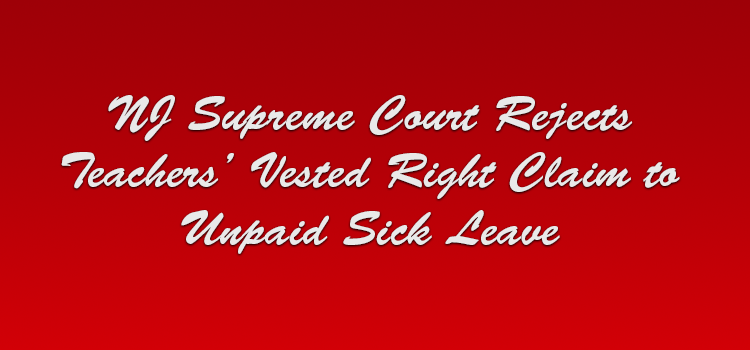
Facts of Barila v. Board of Education of Cliffside Park
The litigation arose from a July 1, 2015 collective negotiations agreement (the 2015 Agreement) between the Board of Education of Cliffside Park (the Board) and the majority representative of the school district’s teachers, the Cliffside Park Education Association (the Association). In exchange for the Board’s significant concessions on other issues, the Association agreed to a reduction in the cap on the maximum amount of compensation that a teacher would receive for accumulated unused sick leave when he or she retired; rather than the $25,000 cap on that compensation prescribed by previous collective negotiations agreements, the 2015 Agreement provided for a $15,000 cap.
After the Association informed its members of the change, plaintiffs Paul Barila, William J. Ludwig, Candace R. Cantor, and Dennis Enrico, all Cliffside Park teachers who had not yet retired, objected to the new provision. Each plaintiff had accumulated sick leave that would have been worth more than $15,000 under prior collective negotiations agreements in the event that the sick leave remained unused at the time of the teacher’s retirement. Notwithstanding plaintiffs’ objection, the Association’s members ratified the new agreement.
Plaintiffs sued the Board, asserting a claim for “vested and/or contractual rights.” They contended that they had a vested right to unused sick leave compensation up to the previous cap of $25,000, and that the Board and the Association lacked authority to negotiate away that right without each plaintiff’s consent. Plaintiffs moved for summary judgment on that claim, and the Board cross-moved for summary judgment, contending that the controversy was a scope-of-negotiations dispute within the exclusive jurisdiction of the Public Employee Relations Commission (PERC).
The trial court rejected the Board’s challenge to subject matter jurisdiction. Reasoning that a teacher’s right to compensation for accumulated sick leave vests when he or she fulfills the service conditions of a collective negotiations agreement and that his or her vested right to that compensation survives the expiration of that agreement, the court concluded that the Board and the Association lacked the authority to bargain away plaintiffs’ vested right to be compensated for unused accumulated sick leave up to $25,000. It therefore granted summary judgment in favor of plaintiffs on their vested-rights claim. Relying primarily on case law, the Appellate Division affirmed both the trial court’s assertion of subject matter jurisdiction and its judgment on plaintiffs’ vested-rights claim.
NJ Supreme Court’s Decision in Barila v. Board of Education of Cliffside Park
The New Jersey Supreme Court concurred with the Appellate Division that the parties’ dispute did not raise a scope-of-negotiations question and that the trial court therefore properly asserted subject matter jurisdiction. However, it reversed Appellate Division’s judgment on the vested-rights claim.
The court first addressed the scope-of-negotiations question. It noted that under the scope-of- negotiations test set forth in In re Local 195, 88 N.J. 393, 403-04 (1982), a subject matter must meet three requirements to be deemed negotiable: the subject must “intimately and directly affect[] the work and welfare of public employees”; the subject must not have been “preempted by statute or regulation”; the subject must be one “on which negotiated agreement would not significantly interfere with the exercise of inherent management prerogatives pertaining to the determination of governmental policy.”
The New Jersey Supreme Court agreed with the lower courts in that subject matter jurisdiction was properly invoked. “Plaintiffs’ challenge to the Board’s and Association’s authority to bargain rights that plaintiffs contend were vested bears no resemblance to a contention that the subject matter in dispute is a non-negotiable managerial prerogative. Neither the Board nor the Association took the position that compensation for unused sick leave is a question of public policy exempt from mandatory negotiation, or sought PERC’s review,” Justice Patterson explained. “As the trial court and Appellate Division noted, plaintiffs never argued that the Board and the Association lacked the authority to negotiate changes to the compensation formula for unused sick leave; they contend only that they had vested rights in the payout terms of prior agreements and that, without their approval, the Board and the Association could limit their compensation by collective negotiation agreement only prospectively.”
The New Jersey Supreme Court next turned to the key issue in the case, holding that the trial court and the Appellate Division got it wrong when they concluded that the Board and the Association lacked the authority to reduce the cap on unused accumulated sick leave compensation from $25,000 to $15,000. “As the governing contracts made clear, a given teacher’s right to sick leave compensation did not vest until that teacher, having served the length of time required by the agreement, retired or otherwise separated from employment with his or her sick leave still unused,” Justice Patterson wrote. “When the Board and the Association limited such compensation in their 2015 Agreement for the Association’s members, they did not infringe on a vested right.” The court further held that the cases on which the trial court and Appellate Division relied address distinct issues and warrant no departure from the unambiguous contractual terms to which the Board and the Association agreed. “Instead, the case law underscores the critical importance of contractual intent,” Justice Patterson wrote.
The New Jersey Court system is relying on technology to remain “open” amid the Coronavirus (COVID-19) epidemic. According to the Supreme Court of New Jersey, more than 12,000 court events involving more than 80,000 participants have taken place remotely since March 16, 2020.

Remote Court Proceedings
New Jersey judges and court employees have been working remotely due to COVID- 19 since March 16. To help facilitate filings while court houses are closed, the Judiciary has expedited the expansion of its Electronic Document Submission (JEDS) system. It has also relaxed certain rules, such as authorizing electronic service via email and allowing electronic signatures.
The New Jersey Judiciary has also been conducting a wide range of proceedings via video and phone. Just like workers across New Jersey, the courts are relying on platforms like Zoom and Microsoft Teams to conduct business.
In its latest Order, dated April 20, 2020, the New Jersey Supreme Court reinforced that most court events that can be conducted using video or phone options will proceed, even over the objection of an attorney or party. Exceptions include sentencing hearings, juvenile delinquency adjudications, and termination of parental rights trials.
The New Jersey Supreme Court’s recent Order also addressed public access to remote court proceedings, stating that live streaming technology will be primarily reserved for criminal matters. “Over the past month, the New Jersey courts have leveraged technology to enable remote proceedings in all divisions of the trial courts as well as in the Supreme Court, Appellate Division, and Tax Court,” the court wrote in an accompanying notice to the bar. “Nevertheless, our resources are finite, and the Court has determined to prioritize live-streaming for most criminal matters and to permit live-streaming for court events in other divisions based on an individualized determination.”
Pursuant to the Order, interested persons may request real-time access to observe events that are not livestreamed (so long as those events are not proscribed from public access). Requests to observe an event that is not livestreamed must be directed to the judge handling the matter.
Other Proceedings Still Delayed
Under the New Jersey Supreme Court’s latest COVID-19 order, municipal court sessions can resume by video or phone with appropriate notice to all parties on May 11, however only to the “extent possible based on facilities, technology, and other resources.” Disciplinary hearings for attorneys and fee arbitrations in “relatively straightforward matters” will resume via virtual proceedings on May 11.
While technology is allowing New Jersey courts to remain operations, not all proceedings are amenable to technology. Jury trials and grand jury proceedings continue to be suspended and will not resume until at least May 31. Landlord/tenant trials are also postponed.
In State v. Isaiah Bell (A-58-18/081743) (Decided April 14, 2020), the Supreme Court of New Jersey held that a prosecutor’s failure to instruct the grand jury on lesser-included offenses for murder in response to questions posed by a grand juror did not constitute an abuse of prosecutorial discretion. However, it held that, going forward, “where there is a rational basis for providing instructions on lesser-included offenses in response to grand jurors’ questions considered in context, prosecutors should instruct the grand jury on lesser- included offenses and advise the grand jury that trial courts may incorporate lesser-included offenses whether or not the grand jury charges them.”
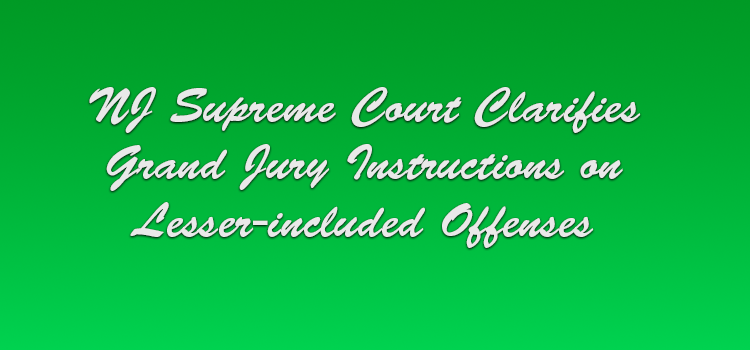
Facts of the Case
Defendant Isaiah Bell was arrested after James Kargbo died from stab wounds apparently inflicted during an altercation that occurred when defendant and his partner arrived at Kargbo’s house to pick up her son. A Somerset County prosecutor asked a grand jury to consider two charges against defendant: murder, a crime of the first degree, and third-degree possession of a weapon for an unlawful purpose. The prosecutor explained the counts and elements of the offenses.
A grand juror twice asked whether murder had different degrees, and the prosecutor explained that grand jurors do not determine degrees, only whether the facts presented “fit the elements of the crime.” After several witnesses testified and answered questions, the same grand juror asked, “is there such a thing as second-degree murder?” The prosecutor responded by discussing the grand jury’s responsibilities regarding “lesser included lower offenses,” and the elements of murder. The grand juror asked, “[T]here’s no part of the . . . statute that speaks to premeditation?” The prosecutor confirmed that there was not and read the model jury charge for murder. The grand jury indicted defendant on both counts.
Defendant moved to dismiss the indictment claiming that, because the grand jury asked about lesser-included offenses, the prosecutor should have explained the lesser- included offenses for murder. The court denied the motion, finding that the grand jury was not requesting instructions on lesser-included offenses, but rather “clarification.” The Appellate Division denied defendant’s motion for leave to appeal.
New Jersey Supreme Court’s Decision
The New Jersey Supreme Court affirmed. “We determine that the prosecutor did not impermissibly interfere with the grand jury’s investigative functions,” Justice Solomon wrote. “We agree with the trial judge that the grand jury here sought clarification rather than specific instructions on lesser-included offenses for murder, and we therefore affirm the trial court’s order denying defendant’s motion and request for reconsideration.”
In reaching its decision, the court emphasized that a deficiency premised upon alleged prosecutorial misconduct does not require dismissal of an indictment unless the prosecutor’s misconduct is extreme and clearly infringes upon the grand jury’s decision- making function. It also noted that courts in other jurisdictions have generally found no affirmative duty to instruct grand juries on lesser-included offenses but have been nearly uniform in ruling that prosecutors may not mislead grand jurors if they pose questions about lesser-included offenses.
The New Jersey Supreme Court adopted the same position, concluding that the constitutional protections afforded defendants by the grand jury process are not undermined by the failure to charge lesser-included offenses. The court further found that the trial court did not abuse its discretion in denying defendant’s motion to dismiss the indictment.
“The prosecutor did so here and made no misstatements or misleading representations. No subversion of the grand jury process occurred, “ Justice Solomon wrote. “The prosecutor dutifully, honestly, and in good faith answered the grand juror’s questions. That the prosecutor did not instruct the grand jury on lesser-included offenses for murder does not constitute an abuse of the prosecutor’s broad discretion warranting dismissal of the indictment.”
While the court held that no instruction as to lesser-included offenses was needed in this particular case, it noted that other cases may call for such instructions. “When the grand jurors’ questions, considered in context, ask about lesser- included offenses and there is a rational basis for instructions on lesser-included offenses, the better practice for prosecutors is to provide them and advise the grand jury that the trial court may include instructions on lesser-included offenses whether or not the grand jury authorizes them,” Justice Solomon explained. “That will ensure that grand jurors are fully informed of the consequences of their decisions.”
The Supreme Court of New Jersey has authorized new law school graduates to begin practicing even though they have not yet passed the bar exam. Under the court’s order, they will be permitted to practice temporarily under the supervision of experienced attorneys.

“At this challenging time, the public has a continuing and growing need for legal services in many critical areas,” Chief Justice Stuart Rabner stated in a press release issued by the court. “Newly admitted lawyers can help meet that need. The Court also recognizes that, without a means to pass the bar and obtain a law license, qualified students who expect to graduate this spring may lose job offers, be unable to find legal work, and otherwise suffer financial hardship.”
NJ Supreme Court’s Supervised Practice Order
The New Jersey Supreme Court’s order first confirms that the bar exam scheduled for July cancelled. It goes on to outline a plan to allow law school graduates to temporarily practice by relaxing the New Jersey Rules of Court.
Specifically, Rule 1:21-3 is relaxed and expanded so that 2020 law school graduates who have not previously taken a bar examination may be authorized to practice law under the supervision of a licensed attorney who has been licensed to practice for at least three years. The expanded ability to temporarily practice law under the order is limited to 2020 graduates of ABA accredited law schools who have not previously taken the bar examination (“2020 graduates”). They must satisfy the following requirements:
- 2020 graduates must satisfy the provisions of Rule 1:24-1 and submit complete applications to sit for the first bar examination scheduled after graduation (e.g., Fall 2020). Accordingly, 2020 graduates must submit payment of the applicable fee and all materials required for review and certification by the Board and the Committee on Character, no later than the final deadline of June 5, 2020.
- 2020 graduates must be certified by the Committee on Character before they are authorized to practice under supervision under this order.
- After all of the necessary conditions are met, the Board will issue individual orders that temporarily authorize 2020 graduates to practice law under supervision. 2020 graduates may then enter appearances, draft legal documents and pleadings, provide legal services to clients, engage in negotiations and settlement discussions, and provide other counsel consistent with the practice of law in New Jersey, provided that each graduate acts under the supervision of a New Jersey attorney who is in good standing and has held a plenary license to practice law in New Jersey for at least three years. The supervising attorney’s name and bar ID should appear on any papers filed with the courts.
- 2020 graduates are required to apply and sit for the first bar examination scheduled after graduation. 2020 graduates who cannot sit for that examination must apply to the Board to carry over their bar application to the next available administration of the examination (e.g., February 2021).
- The ability to temporarily practice law under supervision will continue until bar examination results are available. 2020 graduates who pass the bar examination and otherwise satisfy the Rules of Court concerning the admission to practice law in New Jersey, which shall automatically supersede and terminate their temporary authorization to practice law under supervision. 2020 graduates who do not pass the bar examination will no longer be eligible to temporarily practice law under supervision.
Several other states, including New York, are currently considering similar plans.
In State v. Mark Jackson; State v. Jamie Monroe (A-18/19-19/083286) (Decided April 1, 2020), the Supreme Court of New Jersey affirmed an Appellate Division decision holding that prosecutors may subpoena inmates’ recorded telephone conversations.
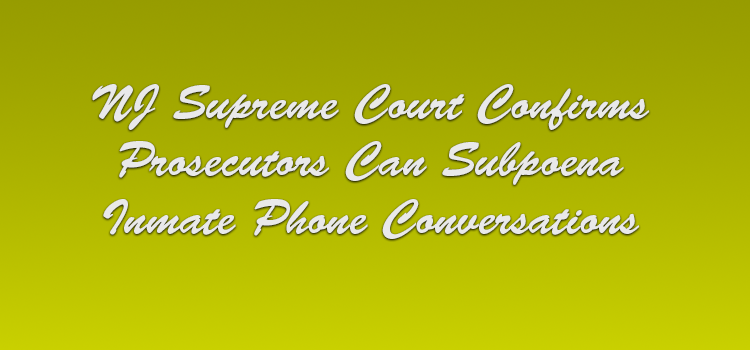
Facts of State v. Jackson; State v. Monroe
Defendant Mark Jackson was arrested after his mother notified the authorities that he had brought $2600 in stolen coins to her home. The Essex County Correctional facility, where Jackson was incarcerated, permits inmates to make unmonitored and unrecorded telephone calls only to legal counsel and Internal Affairs; all other calls are monitored and recorded. Inmates are informed of the recording policy both at the beginning of each phone call and through a release form, which Jackson signed. Several months after Jackson’s arrest, his attorney notified the Prosecutor’s Office that Jackson’s mother had indicated she could not testify as to who left the coins in her home. A grand jury subpoena directed to the correctional facility requested the recordings of all of Jackson’s calls to his mother’s number. Once the State received the recordings, the original indictment against Jackson was superseded to include a witness tampering count.
While being processed at a police station for pending drug and firearms offenses, defendant Jamie Monroe called a person also suspected of drug distribution. Monroe was held at the Middlesex County Department of Adult Corrections, which has a policy similar to the one described above regarding the recording of phone calls; it provides both aural and written notice of that policy. The Prosecutor’s Office served a grand jury subpoena on the facility for recordings of all calls made to the suspected dealer’s number. Upon review, an officer learned that Monroe had called that number and several other numbers to obtain help in laundering money to post bail. Monroe was charged with additional offenses, and those he called were also charged with a number of offenses. The trial court granted motions to suppress the calls in both cases.
Appellate Division’s Decision in State v. Jackson; State v. Monroe
The Appellate Division reversed. It held that the inmates had no reasonable expectation of privacy in the recorded phone calls at issue, and the Prosecutor’s Office was authorized to obtain the recordings without a search warrant, a communications data warrant, or a wiretap order.
The Appellate Division first held that the New Jersey Wiretapping and Electronic Surveillance Control Act (the Act) and Title III of the Federal Omnibus Crime Control and Safe Streets Act of 1968 (Title III) did not apply. Noting that both acts “bar the interception of wire communications” without “a wiretap order or communications data warrant,” the appeals court stated that proscription “simply excludes inmate phone calls recorded in prison facilities.”
As explained by Judge Carmen Alvarez, “[s]ince the recording of such calls is not an interception within the Act or Title III’s purview, logically, sharing the information with another law enforcement agency under the authority of a grand jury subpoena is not a violation.” The court found support for that holding through analogy to the inter-agency sharing of intelligence, which is expressly authorized by both Title III and the Act. Stressing that “[t]he use made by the Prosecutor’s Office of these recordings was ‘appropriate to the proper performance of the official duties of the officer making or receiving the disclosure’” as required by both 18 U.S.C. § 2517(1) and N.J.S.A. 2A:156A-17(a), the court reasoned that even if Title III and the Act did apply here, “sharing the information inter-agency was nonetheless lawful.” The court further concluded that “[p]roviding the recordings made by the correctional facility to the Prosecutor’s Office was not a separate interception.”
The Appellate Division further held that the defendants had no constitutionally protected objectively reasonable expectation of privacy in their recorded phone calls. In reaching its decision, the appeals court determined that the correctional facilities’ interest in maintaining institutional security and public safety outweighed the inmates’ right to privacy. “[I]f an inmate knows he or she is being monitored and recorded when speaking on the phone, it is unreasonable to conclude either that the inmate retains a reasonable expectation of privacy, or that the inmate’s loss of privacy should be limited to the one law enforcement agency . . . that is recording the conversation,” Judge Alvarez wrote.
New Jersey Supreme Court’s Decision in State v. Jackson; State v. Monroe
The New Jersey Supreme Court affirmed in a one-page order. “The judgment of the Appellate Division is affirmed substantially for the reasons expressed in that court’s opinion,” the court wrote.
